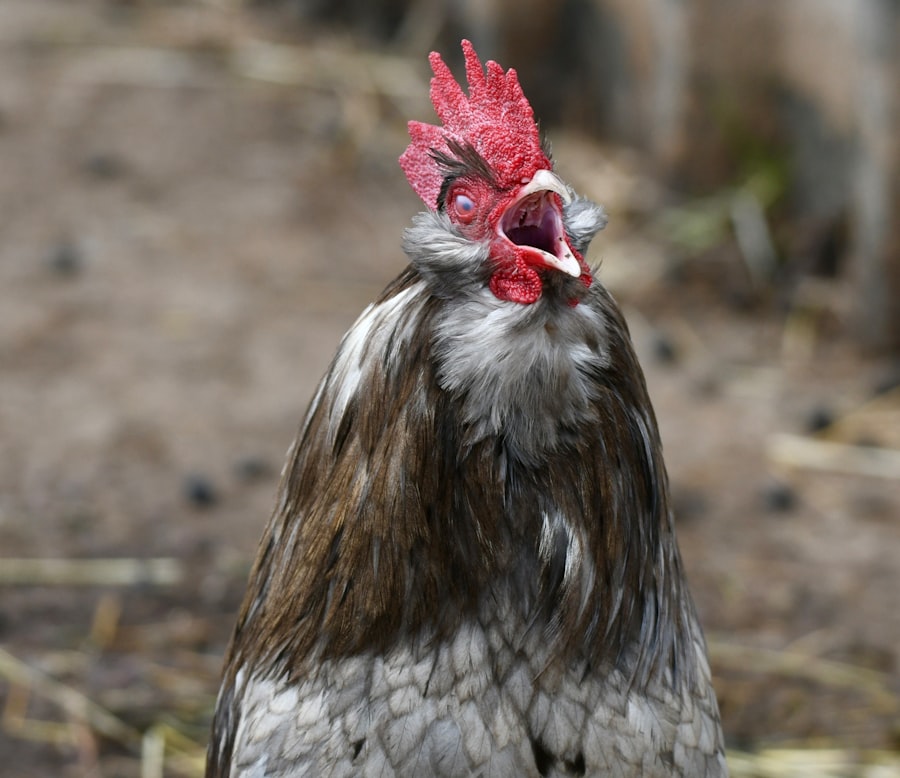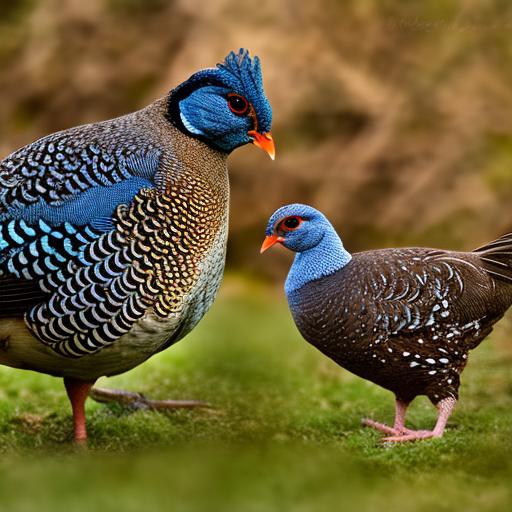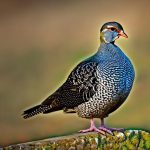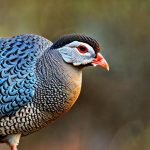When it comes to housing for guinea fowl, there are a few key factors to consider in order to provide a safe and comfortable environment for these unique birds. First and foremost, it’s important to provide adequate space for guinea fowl to roam and forage. Guinea fowl are highly active birds and require plenty of space to move around, so a spacious outdoor enclosure is essential. This can be in the form of a large fenced-in area or a coop with access to an outdoor run.
In addition to space, it’s important to consider the shelter and protection from the elements that the housing provides. Guinea fowl are hardy birds, but they still require shelter from extreme weather conditions such as rain, wind, and cold temperatures. A well-constructed coop with a solid roof and walls will provide the necessary protection from the elements. It’s also important to provide adequate ventilation to prevent the buildup of moisture and ammonia from droppings, which can lead to respiratory issues for the birds.
Lastly, it’s important to consider the security of the housing to protect guinea fowl from predators. Guinea fowl are vulnerable to predators such as foxes, raccoons, and birds of prey, so it’s essential to have a secure enclosure with strong fencing and predator-proofing measures in place. Additionally, providing roosting areas off the ground can help protect guinea fowl from ground-dwelling predators. Overall, choosing the right housing for guinea fowl involves providing ample space, shelter from the elements, and security from predators to ensure the well-being of these birds.
Key Takeaways
- Choose a housing option that provides protection from predators and the elements, with ample space for guinea fowl to roam and roost.
- Provide a balanced diet of commercial game bird feed, supplemented with greens, insects, and grit to ensure proper nutrition for guinea fowl.
- Regularly monitor the health of guinea fowl and seek veterinary care for any signs of illness or injury.
- Understand the social behavior of guinea fowl and provide opportunities for socialization within the flock.
- Create a suitable environment for breeding and reproduction, including nesting boxes and a quiet, secluded area for brooding.
- Implement predator protection measures such as secure fencing, predator-proof housing, and the use of guard animals to keep guinea fowl safe.
- Use positive reinforcement and patience when training and handling guinea fowl, and avoid chasing or stressing the birds.
Feeding and Nutrition for Guinea Fowl
Proper feeding and nutrition are essential for the health and well-being of guinea fowl. These birds are omnivorous and have a varied diet that includes insects, seeds, grains, and vegetation. When it comes to feeding guinea fowl in a domestic setting, it’s important to provide a balanced diet that meets their nutritional needs. This can be achieved through a combination of commercial poultry feed and supplemental foraging opportunities.
A high-quality commercial poultry feed formulated for game birds or poultry can serve as the foundation of a guinea fowl’s diet. Look for a feed that is specifically designed for guinea fowl or game birds, as these will contain the necessary protein, vitamins, and minerals that guinea fowl require. In addition to commercial feed, providing access to a range of foraging opportunities can help mimic the natural diet of guinea fowl. This can include access to grassy areas for grazing, as well as opportunities to hunt for insects and other small prey.
It’s also important to provide access to clean, fresh water at all times, as guinea fowl require ample hydration, especially during hot weather or when laying eggs. Additionally, providing access to grit or small stones can help guinea fowl with digestion by aiding in the breakdown of food in their gizzards. Overall, a balanced diet that includes commercial poultry feed, foraging opportunities, and access to clean water will help ensure that guinea fowl receive the nutrition they need to thrive.
Health and Veterinary Care for Guinea Fowl
Maintaining the health of guinea fowl is essential for their overall well-being and longevity. While guinea fowl are generally hardy birds, they are still susceptible to certain health issues that require attention and care. Regular observation of the flock is important in order to detect any signs of illness or injury early on. Common health issues in guinea fowl can include respiratory infections, parasites, and injuries from predators or accidents.
When it comes to veterinary care for guinea fowl, it’s important to work with a veterinarian who has experience with poultry or avian species. A knowledgeable veterinarian can provide guidance on preventative care measures such as vaccinations and parasite control, as well as treatment options for common health issues. Additionally, having a basic understanding of first aid for poultry can be helpful in addressing minor injuries or illnesses that may arise.
In addition to veterinary care, providing a clean and sanitary living environment is crucial for maintaining the health of guinea fowl. Regular cleaning of the coop or housing area, as well as providing access to dust baths for dusting and preening, can help prevent the buildup of parasites and maintain good hygiene for the birds. Overall, proactive observation, access to veterinary care, and good hygiene practices are key components of maintaining the health and well-being of guinea fowl.
Understanding Guinea Fowl Behavior and Socialization
Guinea fowl are social birds that thrive in a flock environment. Understanding their behavior and social dynamics is important for providing appropriate care and management of these birds. Guinea fowl are highly social and form strong bonds within their flock. They are also known for their alert and vigilant nature, making them excellent watchful guardians against pests and predators.
In terms of socialization, guinea fowl thrive when kept in groups rather than solitary confinement. They are known to establish a pecking order within their flock, so providing ample space and resources can help minimize aggression and competition among birds. It’s also important to introduce new birds to an existing flock gradually to minimize stress and potential conflicts.
Guinea fowl are also known for their vocalizations, which can range from loud calls to soft chirps depending on their mood or perceived threats. Understanding their vocalizations can help in identifying potential stressors or threats in their environment. Overall, understanding guinea fowl behavior and social dynamics is essential for providing appropriate care and management of these unique birds.
Breeding and Reproduction of Guinea Fowl
Breeding guinea fowl requires careful consideration of several factors in order to successfully raise healthy offspring. Guinea fowl are seasonal breeders, typically mating in the spring and early summer months. When it comes to breeding guinea fowl, it’s important to provide a suitable nesting area where hens can lay their eggs in a safe and secluded environment.
Guinea fowl hens are known for their secretive nesting behavior, often choosing hidden spots such as dense vegetation or secluded areas within their enclosure to lay their eggs. Providing nesting boxes or secluded areas with straw or bedding material can encourage hens to lay their eggs in a safe location. It’s also important to collect eggs regularly to prevent them from being damaged or eaten by predators.
Once eggs are laid, they require an incubation period of approximately 26-28 days before hatching. If natural incubation is not desired, eggs can be collected and placed in an artificial incubator set at the appropriate temperature and humidity levels for successful hatching. It’s important to monitor the development of the eggs closely during incubation and provide appropriate care for newly hatched keets.
When raising guinea fowl keets, it’s important to provide a warm and secure brooding area with access to food and water suitable for young chicks. Additionally, providing protection from predators is crucial during the vulnerable early stages of life. Overall, successful breeding and reproduction of guinea fowl requires careful consideration of nesting areas, incubation methods, and proper care for young keets.
Predator Protection and Security for Guinea Fowl

Protecting guinea fowl from predators is essential for ensuring their safety and well-being in an outdoor environment. Guinea fowl are vulnerable to a variety of predators including foxes, raccoons, dogs, cats, birds of prey, and even larger snakes. Providing adequate security measures is crucial for preventing predation on guinea fowl.
One effective method of predator protection is through the use of secure fencing around the outdoor enclosure or coop area. This can help prevent ground-dwelling predators from gaining access to the birds. Additionally, using hardware cloth or wire mesh with small openings can help prevent smaller predators such as snakes or rodents from entering the enclosure.
In addition to secure fencing, providing roosting areas off the ground can help protect guinea fowl from ground-dwelling predators during the night. Elevated roosts or perches within the coop area can provide a safe place for guinea fowl to rest out of reach from potential threats.
Lastly, employing predator deterrents such as motion-activated lights or sound devices can help deter nocturnal predators from approaching the enclosure. Additionally, having a vigilant livestock guardian animal such as a dog or goose can provide an added layer of protection against potential threats.
Overall, implementing secure fencing, elevated roosting areas, predator deterrents, and employing livestock guardian animals are effective measures for protecting guinea fowl from predators in an outdoor environment.
Tips for Training and Handling Guinea Fowl
Training and handling guinea fowl requires patience and understanding of their natural behaviors. Guinea fowl are known for their independent nature and may be more challenging to train compared to other poultry species such as chickens or ducks. However, with consistent training and positive reinforcement, it is possible to establish a level of trust and cooperation with guinea fowl.
When it comes to training guinea fowl, it’s important to start with young birds if possible as they may be more receptive to training compared to older individuals. Positive reinforcement techniques such as offering treats or rewards can help encourage desired behaviors such as coming when called or entering a designated area.
Handling guinea fowl requires gentle and calm interactions in order to minimize stress on the birds. It’s important to approach them slowly and avoid sudden movements that may startle them. Additionally, providing regular interactions with humans from a young age can help acclimate guinea fowl to human presence and reduce fearfulness.
It’s also important to establish a routine with regular feeding times and interactions in order to build trust with guinea fowl. Consistency in handling and training methods can help establish a level of comfort and cooperation with these unique birds.
Overall, training and handling guinea fowl requires patience, consistency, and positive reinforcement techniques in order to establish trust and cooperation with these independent birds.
Guinea fowl are known for their skittish and independent nature, making them a unique challenge to train and handle. Patience is key when working with guinea fowl, as they may take longer to warm up to new routines and commands. Consistency in training methods and handling practices is also important, as guinea fowl thrive on predictability and routine. Positive reinforcement techniques, such as using treats and praise, can help to build trust and cooperation with these birds. By approaching training and handling with patience, consistency, and positive reinforcement, it is possible to develop a strong bond with guinea fowl and successfully work with them in a variety of settings.
If you’re considering keeping guinea fowl at home, you may also be interested in learning about the dietary needs of geese. Poultry Wizard has a helpful article on whether geese can eat chicken feed, which provides valuable insights into the nutritional requirements of these birds. Understanding the specific dietary needs of different poultry species is essential for their health and well-being. Check out the article here to learn more about feeding geese and how it relates to keeping guinea fowl.
FAQs
What are guinea fowl?
Guinea fowl are a type of bird that are native to Africa. They are known for their distinctive spotted feathers and loud, distinctive call.
What do guinea fowl eat?
Guinea fowl are omnivores and will eat a variety of foods including insects, seeds, and small fruits. They are also known to forage for food on the ground.
How do I keep guinea fowl at home?
To keep guinea fowl at home, you will need a secure enclosure to protect them from predators. They will also need access to fresh water and a balanced diet. It’s important to provide them with enough space to roam and forage.
Do guinea fowl make good pets?
Guinea fowl can make good pets for some people, but they are not as domesticated as chickens and can be more challenging to care for. They are known for being noisy and can be skittish around humans.
Are guinea fowl good for pest control?
Yes, guinea fowl are known for their ability to control pests such as ticks, flies, and other insects. They are often kept on farms and homesteads for this purpose.
Do guinea fowl need a roost?
Guinea fowl do not roost like chickens, but they do need a sheltered area to rest and sleep at night. Providing them with a low roost or platform can give them a place to perch if they choose.
Meet Walter, the feathered-friend fanatic of Florida! Nestled in the sunshine state, Walter struts through life with his feathered companions, clucking his way to happiness. With a coop that’s fancier than a five-star hotel, he’s the Don Juan of the chicken world. When he’s not teaching his hens to do the cha-cha, you’ll find him in a heated debate with his prized rooster, Sir Clucks-a-Lot. Walter’s poultry passion is no yolk; he’s the sunny-side-up guy you never knew you needed in your flock of friends!







